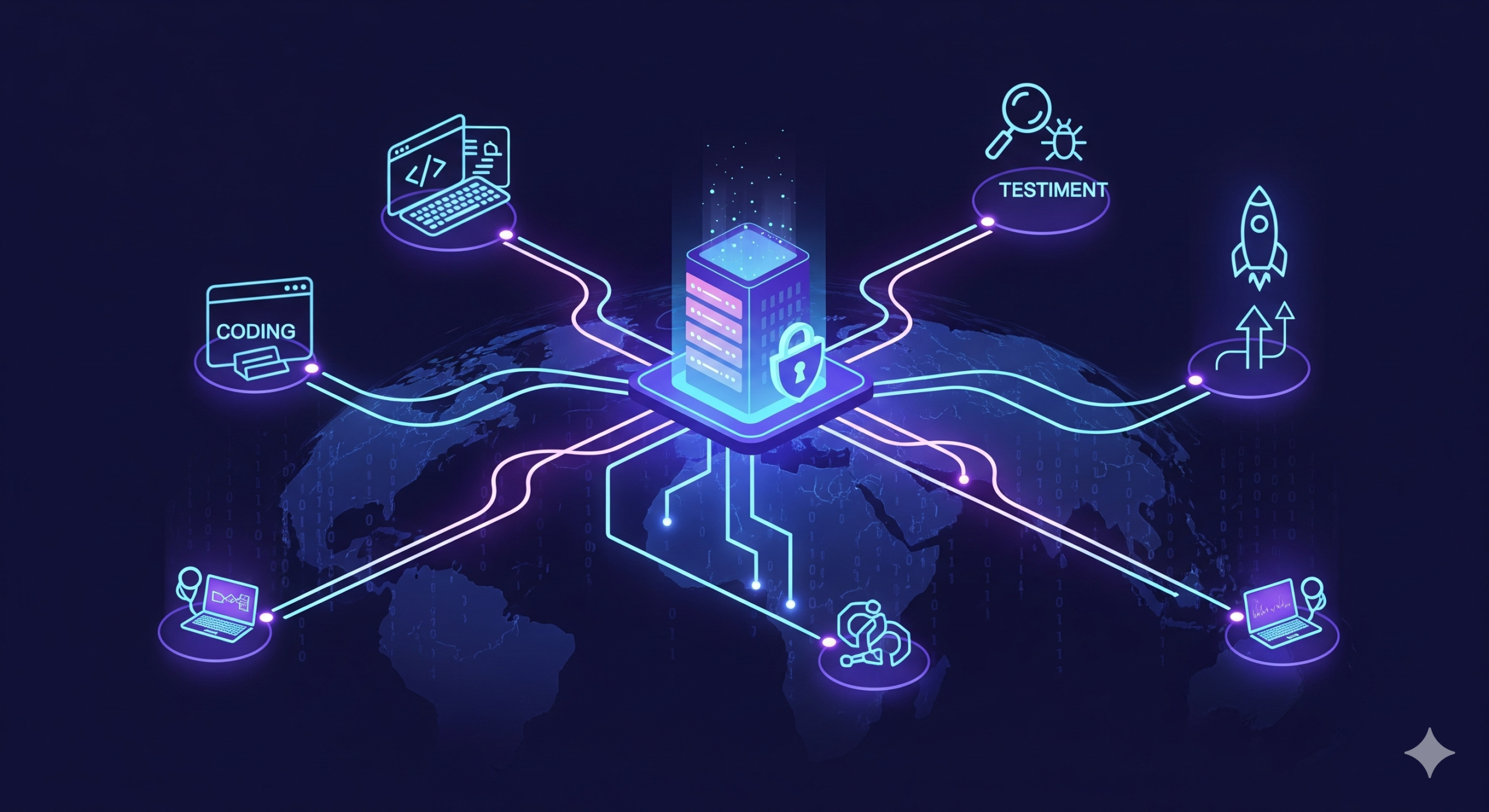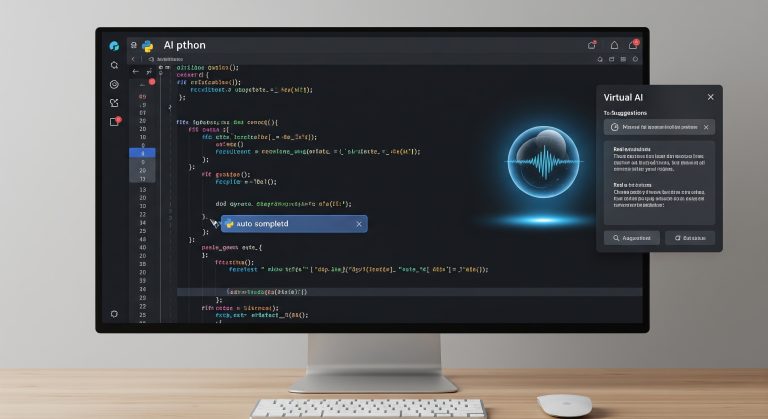1. Introduction
For startups and SMEs embracing the agility and scalability of outsourced development, the global landscape offers immense opportunities. However, this expansion also introduces critical considerations around cybersecurity and compliance that cannot be overlooked. Businesses must proactively address data privacy, intellectual property (IP) protection, and adherence to regulations like GDPR to safeguard their businesses and maintain customer trust in a global environment. Ignoring these aspects can lead to severe financial penalties, reputational damage, and ultimately, hinder growth.

This blog post will delve into the key cybersecurity and compliance considerations that startups and SMEs must prioritize when outsourcing their development efforts. We will explore the potential risks and provide actionable insights to help you navigate this complex terrain effectively.
2. Understanding the Stakes: Why Cybersecurity and Compliance Matter in Outsourcing
Outsourcing development often involves sharing sensitive data and entrusting core technological assets to external partners, potentially located in different jurisdictions with varying legal frameworks. This inherently introduces new security vulnerabilities and compliance obligations. Failure to address these adequately can result in:
- Data Breaches and Financial Losses: Security incidents can lead to the exposure of sensitive customer data, resulting in significant financial losses due to recovery costs, legal fees, and regulatory fines.
- Reputational Damage and Loss of Customer Trust: Data breaches erode customer trust and can severely damage your brand reputation, making it difficult to attract and retain customers.
- Legal and Regulatory Penalties: Non-compliance with data privacy regulations like GDPR, CCPA, and others can result in hefty fines and legal repercussions.
- Intellectual Property Theft: Sharing your core product ideas and code with external partners without adequate protection puts your IP at risk.
- Business Disruption: Security incidents can disrupt your development process and overall business operations.
3. Key Cybersecurity Considerations When Outsourcing Development
Protecting your digital assets and ensuring a secure development environment requires a multi-faceted approach when outsourcing.
- Thorough Vendor Due Diligence: Your security posture is only as strong as your weakest link. Conduct rigorous due diligence on potential outsourcing partners, evaluating their security practices, certifications (e.g., ISO 27001, SOC 2), and track record. Ask specific questions about their data protection policies, incident response plans, and employee security awareness training.
- Robust Contractual Agreements: Your outsourcing contracts should clearly define security responsibilities, data ownership, confidentiality obligations, and breach notification procedures. Include clauses that mandate adherence to relevant security standards and compliance regulations.
- Data Encryption and Access Control: Implement strong encryption mechanisms for data both in transit and at rest. Establish strict access control policies, ensuring that the outsourcing team only has access to the data and systems necessary for their specific tasks. Utilize multi-factor authentication wherever possible.
- Secure Development Practices: Mandate the adoption of secure coding practices by your outsourcing team. This includes regular code reviews, vulnerability scanning, and adherence to secure development lifecycle principles. Ensure they are aware of common security vulnerabilities like OWASP Top 10.
- Regular Security Audits and Penetration Testing: Conduct regular security audits of your outsourced development environment and engage independent third parties for penetration testing to identify potential vulnerabilities. Ensure that the outsourcing partner is contractually obligated to cooperate with these audits and address any identified weaknesses promptly.
- Incident Response Plan: Develop a comprehensive incident response plan that outlines the steps to be taken in the event of a security breach. Ensure that your outsourcing partner is integrated into this plan and understands their roles and responsibilities.
- Data Residency and Localization: Understand the geographical location of your data and ensure it aligns with relevant data residency requirements and your privacy policies. Consider data localization options if required by regulations or customer expectations.
- Secure Communication Channels: Establish secure communication channels for all interactions with your outsourcing team, utilizing encrypted email and secure file-sharing platforms.
- Monitoring and Logging: Implement robust monitoring and logging mechanisms to track access to sensitive data and systems, detect suspicious activity, and facilitate forensic analysis in case of an incident.
- Clear Exit Strategy: Define a clear exit strategy in your contract, outlining the procedures for data repatriation, knowledge transfer, and the secure termination of the outsourcing agreement.
4. Navigating Compliance Requirements in a Global Environment
Compliance with data privacy regulations is a critical aspect of outsourcing development, especially when dealing with international partners and customers.

- General Data Protection Regulation (GDPR): If your startup or SME handles the personal data of EU residents, you must comply with GDPR, regardless of where your development team is located. This includes obligations related to data subject rights, lawful processing, data minimization, and accountability. Ensure your outsourcing partner understands and adheres to GDPR requirements.
- Other Data Privacy Regulations: Be aware of and comply with other relevant data privacy regulations, such as the California Consumer Privacy Act (CCPA), the Personal Information Protection and Electronic Documents Act (PIPEDA) in Canada, and various regulations in other countries where your customers or operations are based.
- Intellectual Property (IP) Protection: Clearly define IP ownership in your outsourcing contracts. Implement measures to protect your trade secrets, source code, and other proprietary information. This may include non-disclosure agreements (NDAs), restrictions on code usage, and clear ownership clauses. Consider registering your IP where appropriate.
- Industry-Specific Regulations: If your business operates in a regulated industry (e.g., healthcare, finance), ensure that your outsourcing partner complies with relevant industry-specific regulations such as HIPAA, PCI DSS, or others.
- Data Transfer Mechanisms: When transferring personal data outside of certain jurisdictions (e.g., the EU), ensure you have appropriate data transfer mechanisms in place, such as Standard Contractual Clauses (SCCs) or other legally recognized safeguards.
- Regular Compliance Audits: Conduct regular audits to ensure ongoing compliance with relevant regulations and contractual obligations. Work with legal counsel to stay informed about evolving data privacy laws and best practices.
- Transparency with Customers: Be transparent with your customers about your outsourcing practices and how you protect their data. Update your privacy policies to reflect your data processing activities involving third-party vendors.
- Employee Training and Awareness: Ensure that both your internal team and your outsourcing partner’s team are adequately trained on cybersecurity best practices and relevant compliance requirements.
- Jurisdictional Considerations: Understand the legal and regulatory landscape in the countries where your outsourcing partners are located. Be aware of potential differences in data protection laws and enforcement mechanisms.
Conclusion:
Outsourcing development can be a powerful engine for growth and innovation for startups and SMEs. However, CEOs and CTOs must prioritize cybersecurity and compliance from the outset. By conducting thorough due diligence, implementing robust security measures, ensuring adherence to relevant regulations, and fostering a culture of security awareness, you can mitigate the risks associated with outsourcing and build a secure and compliant development ecosystem that protects your business, your customers, and your future. Proactive attention to these critical considerations will not only safeguard your assets but also enhance your reputation and build long-term trust in the global marketplace.
About DigiEx Group
DigiEx Group is a leading Tech Talent Hub and AI-driven Software Development company in Vietnam, backed by over 20 years of global IT experience. Our team, with 2 Tech Development Centers, 150 in-house engineers, and a network of 50+ domain experts, tailors every engagement to your unique roadmap with a suite of services:
Neobank & Fintech Solutions: Cutting-edge digital banking and payment platforms.
Tech Talent Services: Rapid access to Vietnam’s top 2,000+ pre-vetted engineers via our Talent Hub platform.
Custom Software Development: End-to-end product delivery for web, mobile, SaaS, and enterprise systems.
AI Consulting & Development: Design and implementation of AI Agents and automation solutions.





